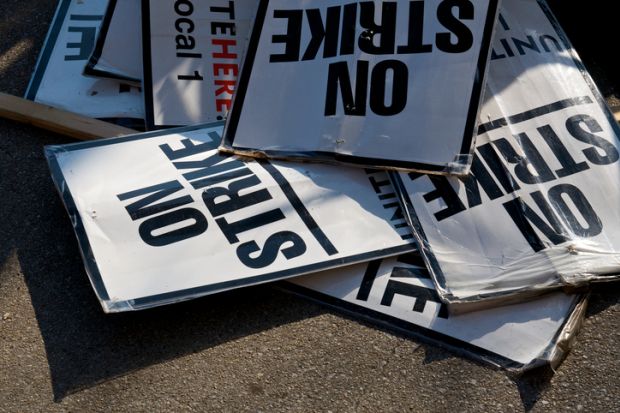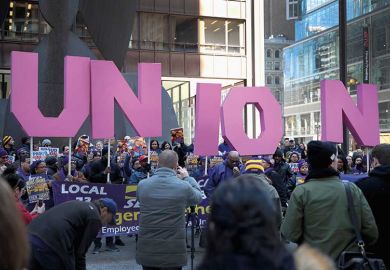Seventy per cent of union members who participated in a fresh ballot for a strike over the pay offer to staff in UK universities backed walking out, but the turnout fell short of the threshold required for industrial action.
Eighty-one per cent of voting University and College Union members also backed action short of a strike in the dispute with employers, but the turnout in the vote was 41 per cent, shy of the 50 per cent minimum introduced by the government in 2017.
The result of the national ballot – announced on the first anniversary of the start of UK higher education’s 2018 pensions strike – closely mirrors the aggregate result of campus-level ballots conducted last year. In those votes, 69 per cent of voting members backed the strike, but the 50 per cent threshold was reached on only seven campuses.
The 50 per cent threshold does not apply in Northern Ireland, where 68 per cent of voting members backed a strike, and 82 per cent supported action short of a strike.
UCU has been locked in a dispute with the University and Colleges Employers’ Association for months over the minimum pay rise for 2018-19 of 2 per cent, rising to 2.8 per cent for the lowest paid.
UCU argues that the offer leaves many staff with below-inflation rises and does nothing to address the falling value of higher education pay, which it says has declined in real terms by 21 per cent since 2010.
The union’s membership has been swelled and reenergised by the 14 days of strike action at 65 universities last year in the separate dispute over reforms to pensions offered by the Universities Superannuation Scheme.
But the results are yet another indication that the 50 per cent threshold represents a significant barrier to sector-wide walkouts.
UCU said that its negotiators would meet on 25 February to decide on the union’s next step.
“The national ballot results show clear support amongst UCU members for action over pay and conditions. However, pernicious ballot restrictions, which single out trade unions for special treatment, mean no action can take place,” said Matt Waddup, the union’s head of policy.
“It is clear from this ballot that staff are angry about the failure of the UK bargaining machinery to deliver improvements to job security, workload and pay inequality and the union will be considering carefully how best we turn that anger into practical action to achieve change.”
A Ucea spokesman said that the ballot showed “the same low level of support for strike action” as the last vote, highlighting that it was “now more than half a year since university employees covered by the national pay negotiations saw pay increases of between 2 and 5 per cent, the average increase at sector level of 3.5 per cent sitting well ahead of last year’s inflation measures”.
“The great majority of higher education staff understand the financial realities for their institutions and have moved on from last year’s balanced and fair pay outcome,” the spokesman said.
“We trust that the trade unions will now, as universities are, focus on the many icebergs and uncertainties facing the sector and engage constructively in this year’s (2019-20) multi-employer negotiating round, which will open at the end of March.”
Register to continue
Why register?
- Registration is free and only takes a moment
- Once registered, you can read 3 articles a month
- Sign up for our newsletter
Subscribe
Or subscribe for unlimited access to:
- Unlimited access to news, views, insights & reviews
- Digital editions
- Digital access to THE’s university and college rankings analysis
Already registered or a current subscriber?








